新概念英语第二册第38课课件
合集下载
新概念英语第二册课件(Lesson 38 Everything except the weather)

After so many years of sunshine, Harrison got
a shock.
after ['ɑ:ftə(r)] prep在…后面; conj.在…以后; adv.以后,继后; adj.后来的,以后的;
汉译英:在这么多天雨之后
after it rained for days = after so many days of rain eg. After six years of hard work, he was successful. get a shock : 吓了一跳, 吃了一惊 eg. She got a shock when she see the telephone bill. 她看到电话帐单大吃一惊
He acted as if he had never lived in England before. as if+句子 : 似乎, 好像 eg. It looks as if it‟s going to rain. 看上去要下雨了 My leg hurts as if it was broken. as if 从句用陈述语气的情况: 表示说话者
Lesson 38
Everything except the weather
except [ik'sept] prep.除了 complain [kəm'plein] v.抱怨 continually [kən'tinjuəli] ad.不断地
bitterly ['bitəli] ad.刺骨地
sunshine ['sʌnʃain] n.阳光
bitterly ['bitəli] adv.刺骨地; 痛苦地
最新新概念英语第二册-38课课件ppt

• ★continuously adv. 不断地,连续地(指动作中间没 有间断)
• You mustn’t watch TV for such a long time continuously.
• This plane can fly continuously for twenty hours. • continually adv. 频繁地,反复地(指动作中间有间
• 后面的从句用一般过去时 • had no sooner done…than +一般过去时, 固定
用法 (时态结构: 完成时态+ than + 一般过去 时)
• He had no sooner arrived than he called me up.
• no sooner 放在句首就要倒装
• No sooner had he arrived than he called me up. (倒装)
If you have ever been to England ,you must be impressed by the beautiful scenery.However,everyhing there is perfect except the weather.
• ★complain v. 抱怨 • complain to sb. 向某人抱怨 • complain of/about sth. 抱怨某事
• immediately
• 1.adv • He lay down and was asleep immediately. • All those who are immediately involved
will be informed of the decision.
• You mustn’t watch TV for such a long time continuously.
• This plane can fly continuously for twenty hours. • continually adv. 频繁地,反复地(指动作中间有间
• 后面的从句用一般过去时 • had no sooner done…than +一般过去时, 固定
用法 (时态结构: 完成时态+ than + 一般过去 时)
• He had no sooner arrived than he called me up.
• no sooner 放在句首就要倒装
• No sooner had he arrived than he called me up. (倒装)
If you have ever been to England ,you must be impressed by the beautiful scenery.However,everyhing there is perfect except the weather.
• ★complain v. 抱怨 • complain to sb. 向某人抱怨 • complain of/about sth. 抱怨某事
• immediately
• 1.adv • He lay down and was asleep immediately. • All those who are immediately involved
will be informed of the decision.
lesson新概念第二册第38课ppt课件
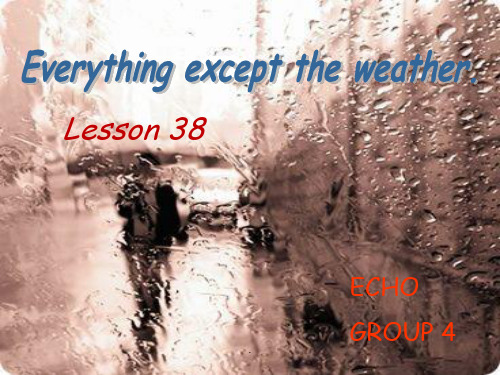
She likes all the books except that blue one.
2. We come to school everyday, but not Monday.
We come to school everyday except Monday.
• ★complain v. |kəm'plein|
England and had planned to settle down
in the country.
dream of doing sth
I have always dreamed of winning the lottery.
1. 水不停从桥下流过。
The river flows under the bridge continuously.
• ★continually • |kən'tɪnjuəli|
adv. (frequently)
1. 小孩时不时地会哭。
The baby cries continually.
2. 天频繁地下雨。
• My old friend, Harrison, had lived in the
Mediterranean for many years before he returned to England.
Had+ v.p.p
past perfect tense
Sb. had done sth before sb did sth
• ★sunshine
• ★except prep. (apart from) |ik‘sept|
•Everyone is here except Lily. (Lily is not here.) 1. She likes all the books, but she does not like that blue one.
2. We come to school everyday, but not Monday.
We come to school everyday except Monday.
• ★complain v. |kəm'plein|
England and had planned to settle down
in the country.
dream of doing sth
I have always dreamed of winning the lottery.
1. 水不停从桥下流过。
The river flows under the bridge continuously.
• ★continually • |kən'tɪnjuəli|
adv. (frequently)
1. 小孩时不时地会哭。
The baby cries continually.
2. 天频繁地下雨。
• My old friend, Harrison, had lived in the
Mediterranean for many years before he returned to England.
Had+ v.p.p
past perfect tense
Sb. had done sth before sb did sth
• ★sunshine
• ★except prep. (apart from) |ik‘sept|
•Everyone is here except Lily. (Lily is not here.) 1. She likes all the books, but she does not like that blue one.
新概念第二册38优秀课件
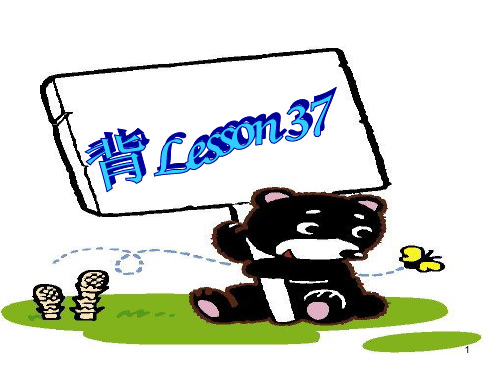
1
将来完成时 will have done...
将来进行时除了表示最近或不久的将来正在进行的动作外, 还可以表示计划或安排好的事:
A great many people will be visiting the country. 将来完成时用于表示到将来某一时刻已经完成的动作。将来
完成时由will have+过去分词构成。它常与by和 not…till/until+表示时间的名词连用。 I hope they’ll have finished it in time for the journey. I expect you will have changed your mind by tomorrow. I will have finished it until/till tomorrow.
Page 4
根据所给的汉语意思写出单词,并用其正确形式填空。
1. He ____(抱怨)to me about the food yesterday. 2. That boy is crying ____(不断地). 3. She sat in the garden enjoying the ____(阳光). 4. We go there every day ____(除了)Sunday. 5. It is ___(刺骨地)cold today. 6. She ____(做梦)that she could fly last night. 7. My father will ____(退休)next year. 8. My legs were so weak that I could ____(几乎不)stand.
Kunming
15
How is the weather in London? Where is London?
将来完成时 will have done...
将来进行时除了表示最近或不久的将来正在进行的动作外, 还可以表示计划或安排好的事:
A great many people will be visiting the country. 将来完成时用于表示到将来某一时刻已经完成的动作。将来
完成时由will have+过去分词构成。它常与by和 not…till/until+表示时间的名词连用。 I hope they’ll have finished it in time for the journey. I expect you will have changed your mind by tomorrow. I will have finished it until/till tomorrow.
Page 4
根据所给的汉语意思写出单词,并用其正确形式填空。
1. He ____(抱怨)to me about the food yesterday. 2. That boy is crying ____(不断地). 3. She sat in the garden enjoying the ____(阳光). 4. We go there every day ____(除了)Sunday. 5. It is ___(刺骨地)cold today. 6. She ____(做梦)that she could fly last night. 7. My father will ____(退休)next year. 8. My legs were so weak that I could ____(几乎不)stand.
Kunming
15
How is the weather in London? Where is London?
新概念英语第二册Lesson 38 课件

1.3 Check the answers.
What had he often dreamed of?
He had often dreamed of retiring in England.
1.3 Check the answers.
What did he begin to complain about?
bitterly cold
2.1 Listen, repeat and check.
04-2 for even though it was still summer, it rained continually and it was often bitterly cold.
complain about even though rain continually
He began to complain about the weather.
1.3 Check the answers.
What he had had for so many years ended there?
The dream he had had for so many years ended there.
New Concept English II Lesson 38
Everything except the weather
Part 1
Warm Up
1.1 Look, think and answer.
What had he often dreamed of?
图片复制到这里
1.1 Look, think and answer.
Part 2
Audiovisual Input
2.1 Listen, repeat and check.
第38课新概念英语第二册lesson 38 精编课件

She had finished writing the composition by 10 :00 this morning.
判断依据
1. 由时间状语来判定 ( 1 ) by + 过去的时间点。 如: I had finished reading the novel by nine o'clock last night. ( 2 ) by the end of + 过去的时间点。 如: We had learned over two thousand English words by the end of last term. ( 3 ) before + 过去的时间点。 如: They had planted six hundred trees before last Wednesday.
生活在热带地区的人,那里的人性情易暴躁和发怒。 居住在寒冷地带的人,具有较强的耐心和忍耐力的性
格。比如生活在北极圈内的因纽特人,被人们称为世界 上“永不发怒的人”。
居住在温暖宜人水乡的人们,因为气候湿润,风景秀 丽,人们对周围事物敏感,且多情善感,机智敏捷。
山区居民,因为山高地广,人烟稀少,开门见山,长
I have time enough to have coffee. 我 有足够的时间喝咖啡
1.Is it sunny and hot in summer in England, just like Tianjin?
2. Why did Harrison sell his house so quickly?
过去完成时
概念:过去完成时表示在过去某一时间或动作之 前已经发生或完成了的动作,即“过去的过去”。
----|---------- |--------------|--->
新概念第二册Lesson38课件

complain v.. complain to sb : 向某人抱怨 complain of/about : 抱怨某事 He complained to the police that the boys had stolen his apples.(控告,声诉)
continue v. The cold wave will continue. He had lunch and then continued his work. continual adj. 1.不间断的, 不停的 I am tired of this continual rain. Church Street is continual with High Street.
no sooner...than : (关联词)一...就... 同义as soon as, the moment ,on doing had no sooner done...than一般过去时, 固 定用法 (时态结构 : 完成时态 + than + 一般 过去时) He had no sooner arrived than he called me up. no sooner放在句首就要倒装 : No sooner had he arrived than he called me up(倒装)
Mediterranean Climate
As is know to all ,a typical English gentleman usually takes an umbrella with him.
Similarly,when people there meet others,they usually begin with the weather .
continue v. The cold wave will continue. He had lunch and then continued his work. continual adj. 1.不间断的, 不停的 I am tired of this continual rain. Church Street is continual with High Street.
no sooner...than : (关联词)一...就... 同义as soon as, the moment ,on doing had no sooner done...than一般过去时, 固 定用法 (时态结构 : 完成时态 + than + 一般 过去时) He had no sooner arrived than he called me up. no sooner放在句首就要倒装 : No sooner had he arrived than he called me up(倒装)
Mediterranean Climate
As is know to all ,a typical English gentleman usually takes an umbrella with him.
Similarly,when people there meet others,they usually begin with the weather .
新概念二 第38课课件

5.sunshine n. 阳光
a drop of sunshine 一缕阳光 She's always like a drop of sunshine.她经常像阳光一样。 sunlight sunlight 日光;阳光,指的是:白天来自太阳的光。 sunshine 阳光;日光,指的是:来自太阳的光和热。
1.except prep. 除了,除了...外。
Except a broken chair, the room has no furniture. 除了一把破椅子,这间房子里什么也没有。(chair与furniture性质相同) except for 除.. 之外 Except for a broken chair, the room is empty. 除了一把破椅子外,这间房子是空的。 (except for没有“所指项目类别”的限制) except that I know nothing about his career except that he is a graduate of Oxford University. 我对他的职业一无所知,只知道他毕业于牛津大学。 except表示“除.....外,(其余都)……”指同一类事物的总体中除去一部分。
课文注释
1.He had often dreamed of retirina in Enaland and had planned to settle dowr in the country.过去他常幻想退休后到英国,并计划在乡间安顿下来。
(1)dream of在这里不表示具体的做梦,而是“幻想”、“向往”的意思: Frank used to dream of having a car of his own. 弗兰克过去常幻想拥有一辆自己的车。 (2)settle down 是个固定短语,可以表示“定居”、“安身”、“安顿”等含义: They settled down in Australia in 1988. 他们1988年在澳大利亚定居了。 After two years of travelling,I want to settle down now. 旅行了两年之后,我现在想过安定的日子了。
新概念英语第二册Lesson38(共48张PPT)

• 我刚走她就打来了电话。(“走”的动作在前, “打电话”在后)
• he had no sooner arrived than he called me up.
• no sooner放在句首就要倒装 :
• No sooner had he arrived than he called me up(倒装) 这个词组表示做过的事情,它不能 用于表示将来的事。
Notes on the text
• 过去完成时:表示过去某一时间和动作之前已经发生或完成了的 动作或一直持续的动作即过去的过去。
• 过去完成时态的标志:
• 1.和by+过去时间点连用,如:
• by the time, by then, by last year, by the end of last year/month..., by five o’clock yesterday, evening...
door. • except 与besides 区别: • besides 表示“除 … 以外,(还,也)”,相当于 in
addition to.
• Besides English, they also study maths and chemistry • 除了英语以外,他们还学习数学和化学。
• 注意: 不要将besides和beside 混淆。 beside是“在…旁边”的意思。
play games with his friends.
• continue doing • 继续做同一件事(还没完成) • After a rest,he continues his reading.
• continually : 连续地, 频繁地(时断时续) • the baby cries continually.
• he had no sooner arrived than he called me up.
• no sooner放在句首就要倒装 :
• No sooner had he arrived than he called me up(倒装) 这个词组表示做过的事情,它不能 用于表示将来的事。
Notes on the text
• 过去完成时:表示过去某一时间和动作之前已经发生或完成了的 动作或一直持续的动作即过去的过去。
• 过去完成时态的标志:
• 1.和by+过去时间点连用,如:
• by the time, by then, by last year, by the end of last year/month..., by five o’clock yesterday, evening...
door. • except 与besides 区别: • besides 表示“除 … 以外,(还,也)”,相当于 in
addition to.
• Besides English, they also study maths and chemistry • 除了英语以外,他们还学习数学和化学。
• 注意: 不要将besides和beside 混淆。 beside是“在…旁边”的意思。
play games with his friends.
• continue doing • 继续做同一件事(还没完成) • After a rest,he continues his reading.
• continually : 连续地, 频繁地(时断时续) • the baby cries continually.
新概念二Lesson 38课件

Listening & comprehension
1.Why did Harrison sell his house so quickly? 2.Did Harrison think of everything?
Lead-in
• 据说平均每个英国人一生中要花6个月的时间谈论 天气问题。 • 一旦碰上好天气,谈话的开场白就固定成了 “It’s a nice day today, isn’t it?”让人不禁想 起一个经典的笑话——一天下午,英国作家萧伯 纳在街上散步,迎面走来一位老先生,开口就是: “下午好!天气很好不是么?”萧伯纳幽默地回 答:“是啊,但是在过去的两个小时里,已经有 20个人告诉过我了,谢谢你。”
Lesson 38 Everything except the weather
Warm up-English jokes
Persistance 缠住不放
• Returning from a golf outing(远足,短途旅行) , my husband was greeted at the door by Sara, our four-year-old daughter. Daddy, who won the golf game? You or Uncle Richie?Uncle Richie and I don't play golf to win, my husband hedged (避免作正面答复) . We just play to have fun.Undaunted, Sare said, Okay, Daddy, who had more fun?
• • • • • • • • • • •
• • •
6、In the end, it was more than he could bear. more than在这里表示“超过……的范围” This piece of news is more than I can believe. It was more than I could understand. I can't affard it. = It was more than I can affard. 这种用法与它通常表示“比……更多”的用法稍有不同: There were more than ten people in the room. 7、He had hardly had time to settle down when he sold the house and left the country. hardly…when… 还没来得及……就……,用法同no sooner…than hardly had sb. done when… (hardly在句首, 要倒装) He had hardly opened his eyes when he was knocked out.(knock out : 打晕, 击倒) have time to do sth. 有时间做某事 I have no time to talk with you. 我没时间和你说话 I have enough time to have coffee.
新概念英语2 38课课件
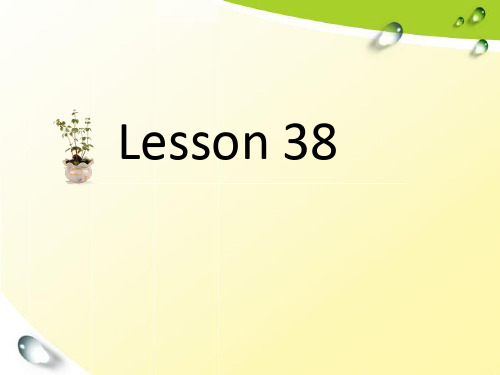
• They settled down in Australia in 1988. • 他们1988年在澳大利亚定居了。
•
After two years of travelling, I want to settle down now. • 旅行了两年之后,我现在想过安定的日子了。
课文详注 Further notes on the text
词汇学习 Word study
• He had hardly had time to settle down when he sold the house and left the country. • 他还没等安顿下来就卖掉了房子,离开了这个国家。 • • Hardly had he had time to settle down when he sold the house and left the country.(译文同上)
• He acted as if be had never lived in England before. • 他的举动就好像他从未在英国生活过一样。 • 连词 as if/ though 引导方式状语从句,通常跟在描述 行为举止的动词之后,如act, appear, feel, look, smell, sound等后面:
• • • • • • • 在第14课的语法中,我们学习了过去完成时的构成和基本用法。它经常与一 般过去时连用,表示在过去某个动作发生前完成的动作: When I arrived, Jane had left.我到时,简已经走了。(走发生在我到达 之前) 与过去完成时连用的表示时间的词或词组有when, after, as soon as, (not) until, by that time, (never) before, already, for, since, just 等, 另外它还常与连词no sooner…than和 hardly…when连用。(cf.词汇学 习)过去完成时不能与副词ago 连用(ago只能与一般过去时连用): He hadn't finished it by yesterday evening. 到昨天晚上他还没做完。
新概念第二册Lesson 38 (共26张PPT)
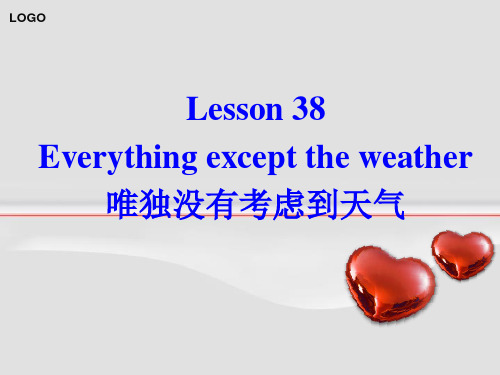
• They are full of complaints about their labor conditions.
• 关于劳动条件他们牢骚一大堆。
continually adv.频繁地,屡次地,反复地
• continue v. • 1)继续,持续(用于不中断的继续或中断后的继续) • The rain continued till late at night. • 雨一直持续到半夜。 • The discussion continued after a break. • 休息一会后讨论继续。 • continue doing /continue to do sth继续做某事 • How can you continue to work with so much noise? • 有这么大噪音,你怎么能继续工作呢?
LOGO
Lesson 38 Everything except the weather
唯独没有考虑到天气
• First listen and then answer the question. • Why did Harrison sell his house so
quickly?
New words and expressions
• He had often dreamed of retiring in England and had planned to settle down in the country.
• settle down定居 • dream of sth/doing sth梦想做某事
• I am always dreaming of living in Spain. • 我总是梦想着居住在西班牙。
11, 2021
• 关于劳动条件他们牢骚一大堆。
continually adv.频繁地,屡次地,反复地
• continue v. • 1)继续,持续(用于不中断的继续或中断后的继续) • The rain continued till late at night. • 雨一直持续到半夜。 • The discussion continued after a break. • 休息一会后讨论继续。 • continue doing /continue to do sth继续做某事 • How can you continue to work with so much noise? • 有这么大噪音,你怎么能继续工作呢?
LOGO
Lesson 38 Everything except the weather
唯独没有考虑到天气
• First listen and then answer the question. • Why did Harrison sell his house so
quickly?
New words and expressions
• He had often dreamed of retiring in England and had planned to settle down in the country.
• settle down定居 • dream of sth/doing sth梦想做某事
• I am always dreaming of living in Spain. • 我总是梦想着居住在西班牙。
11, 2021
新概念英语第二册Lesson 38(共53张PPT)
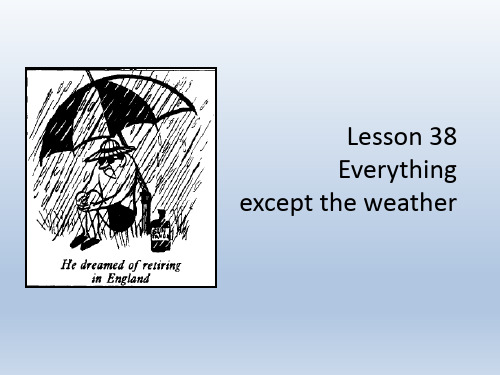
Text
The dream he had had for so many years ended there.
Comprehension questions
• Why didn't he like the weather? • It rained continually and it was often bitterly
cold.
Comprehension questions
• Did he get a shock? • Yes, he did.
Text
1 The sea moves (continuously) (continually). 2 He borrows money from people (continuously) (continually)
Text
• After so many years of sunshine, Harrison got a shock.
before.
WORDS
New words and expressions
New words and expressions
New words and expressions
except prep.
• used to introduce the only person, thing, action, fact, or situation about which a statement is not true
• Had he often dreamed of retiring in England? • Yes, he had.
Comprehension questions
• Where had he planned to settle down? • In the country.
新概念英语第二册第38课 ppt课件
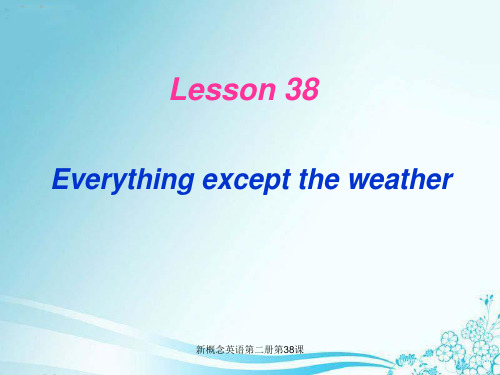
新概念英语第二册第38课
2.Mediterranean n. 地中海 the Mediterranean 3. Complain v. complain to sb. 向某人抱怨 Don`t complain to anyone when you make mistakes. 向某人抱怨某事 complain of/about sth to sb Complain about和complain of 区别: Complain about多用于对你不满意的事情“抱怨”,而complain of多用于“
新概念英语第二册第38课
新概念英语第二册第38课
新概念英语第二册第38课
How is the weatheБайду номын сангаас today?
新概念英语第二册第38课
Moscow
Beijing
Shanghai
Toronto Boston
新概念英语第二册第38课
新概念英语第二册第38课
新概念英语第二册第38课
frost(霜). The two worst months in England are
January and February. They have many cold wet days one after another.
新概念英语第二册第38课
英国属海洋性气候,具有冬暖夏凉的特点,冬夏 没有很大差别,这主要是因为它是一个岛屿国 家。(冬天,海洋比陆地温度高,海风将热量带到 陆地,导致陆地温度升高,夏天则相反).西风 常常吹过英国大陆,致使常年有雨.
the summer, the warmer the sun shines. It’s warmer. The nearer the winter, the colder the days are. In winter they have all kinds of weather. Sometimes it rains and sometimes it snows heavily, and they also have fog and
2.Mediterranean n. 地中海 the Mediterranean 3. Complain v. complain to sb. 向某人抱怨 Don`t complain to anyone when you make mistakes. 向某人抱怨某事 complain of/about sth to sb Complain about和complain of 区别: Complain about多用于对你不满意的事情“抱怨”,而complain of多用于“
新概念英语第二册第38课
新概念英语第二册第38课
新概念英语第二册第38课
How is the weatheБайду номын сангаас today?
新概念英语第二册第38课
Moscow
Beijing
Shanghai
Toronto Boston
新概念英语第二册第38课
新概念英语第二册第38课
新概念英语第二册第38课
frost(霜). The two worst months in England are
January and February. They have many cold wet days one after another.
新概念英语第二册第38课
英国属海洋性气候,具有冬暖夏凉的特点,冬夏 没有很大差别,这主要是因为它是一个岛屿国 家。(冬天,海洋比陆地温度高,海风将热量带到 陆地,导致陆地温度升高,夏天则相反).西风 常常吹过英国大陆,致使常年有雨.
the summer, the warmer the sun shines. It’s warmer. The nearer the winter, the colder the days are. In winter they have all kinds of weather. Sometimes it rains and sometimes it snows heavily, and they also have fog and
新概念英语第二册课件Lesson38(共30页)

govern
说出有关“大”的单词 immense\great\big\large
翻译:为…设立标准
set standard for
….的首都是
the capital of (国家)is
打算做某事
be going to do sth will do sth
be intended to do sth plan to do sth
5、He acted as if he had never lived
in England before. as if+句子 似乎, 好像(引导表示方式 的状语从句,如果从句为过去完成时 则是虚拟语气,描述与事实相反, 后
面的条件是假的) He acted as if he was poor. (as if 后 是真是假, 应根据上下文来看)连词as if/though引导方式状语从句,通常跟 在描述行为举止的动词之后,如act, appear,feel,look,smell,sound
He made us disappointed. I won’t believe
him any more.
He is my idol and the pride of our
Chinese.
Everybody ___w_il_l _b_e_w__a_tc_h_in_g___ anxiously as the new buildings go up. We are all very ____e_x_c_it_e_d________ and are_____l_o_o_k_in_g_f_o_r_w_a_rd__to___ the Olympic Games because they __h_a_v_e__n_e_v_e_r _b_e_h_e_l_d__before in this country.
新概念英语二lesson 38课(共39张PPT)

• • • • • • bitter adj a. 生气、沮丧 对于失去工作他们感到非常的生气。 They are very bitter about losing the jobs. b. 苦的 那药尝起来是苦的。 The medicine tasted bitter. c. 表示“令人不舒服的冷、刺骨的冷”。 课文中bitterly cold是“副词+形容词”的用法, 同样是表示“非常冷、令人不舒服的冷、刺骨的 冷”的意思。 • bitterly disappointed 彻底的失望
瑞雪兆丰年
Complain 抱怨
★complain v. 抱怨
• complain to sb. 向某人抱怨 • complain of/about sth. 抱怨某事 • • • • 我们没有什么可发牢骚的 We have nothing to complain of. 不要向我抱怨了! Don't complain to me !
★continuously adv. 不断地,连续地 (指动作中间没有间断) • 你不许连续看很长时间的电视。 • You mustn’t watch TV for such a long time continuously. • 这架飞机可以连续飞行20小时。 • This plane can fly continuously for twenty hours. • • • • • • continually adv. 频繁地,反复地 (指动作中间有间断但又持续很久) 天频繁地下雨。 It rained continually. 小婴儿不停地哭。 The baby cries continually.
• L38 Everything except the weather
瑞雪兆丰年
Complain 抱怨
★complain v. 抱怨
• complain to sb. 向某人抱怨 • complain of/about sth. 抱怨某事 • • • • 我们没有什么可发牢骚的 We have nothing to complain of. 不要向我抱怨了! Don't complain to me !
★continuously adv. 不断地,连续地 (指动作中间没有间断) • 你不许连续看很长时间的电视。 • You mustn’t watch TV for such a long time continuously. • 这架飞机可以连续飞行20小时。 • This plane can fly continuously for twenty hours. • • • • • • continually adv. 频繁地,反复地 (指动作中间有间断但又持续很久) 天频繁地下雨。 It rained continually. 小婴儿不停地哭。 The baby cries continually.
• L38 Everything except the weather
- 1、下载文档前请自行甄别文档内容的完整性,平台不提供额外的编辑、内容补充、找答案等附加服务。
- 2、"仅部分预览"的文档,不可在线预览部分如存在完整性等问题,可反馈申请退款(可完整预览的文档不适用该条件!)。
- 3、如文档侵犯您的权益,请联系客服反馈,我们会尽快为您处理(人工客服工作时间:9:00-18:30)。
3)严寒的
•
•
a bitter winter 寒冷的冬天 bitterness n.苦味,酸辛,苦难
谁和我同甘共苦呢? Who goes through the happiness and bitterness with me?
1. My old friend, Harrison, had lived in the Mediterranean for many years before he returned to England.
瑞雪兆丰年
Why did Harrison sell his house so quickly?
1. except
prep.
除了,除了…外
• Except a broken chair, the room has no furniture. • 除了一把破椅子,这间房子里什么也没有。(chair与 furniture性质相同) • except for 除…之外 • Except for a broken chair, the room is empty. • 除了一把破椅子外,这间房子是空的。(except for 没有“所 指项目类别”的限制) • except that • I know nothing about his career except that he is a graduate of Oxford University.
except 表示“除……外,(其余都)……”指同一类事物的总体中除 去一部分。
• but prep. 除…之外 ( 与no, nobody, all, anywhere等连用) • Nobody knew her name but me. 除了我之外,没人知道她的名字。 • They were all there on time but the chairman. 除了主席外,其余人都按时到了。
Here are some proverbs,guess the right meaning.
It's rianing cats and dogs. 下得倾盆大雨
A misty morning may have a fine day. 早晨有雾露,可能是晴天。
Let us have a test
A good winter brings a good summer
4. Almost immediately he began to complain about the weather, for even though it was still summer, it rained continually and it was often bitterly cold.
比较这么两个句子:
He walks as if he is drunk.(表示从他的走路姿势来 判断,他是醉了。) He walks as if he were drunk.(表示他根本没有喝酒, 这里只是一个假设)
所以,课文中“as if he had never lived in England before”用的就是虚拟式,所以使用了“have never lived”的过去式“had never lived”。表示Harrison其 实以前是住在英国的。
• but 强调未被排除的其他事物(人) • except 强调所排除之人(事物)
2. complain
vt. 抱怨,控诉(常与that从句连用)
• 1)(常做贬义)抱怨,投诉,发牢骚 • complain to sb about/at sth 对某人抱怨某事 • 抱怨这个恶劣的天气 complain about the terrible weather • 你总是抱怨命运! You are always complaining about your fate! • complain of...诉说(病,痛等) complain of a toothache 牙疼 • 2)(正式地)投诉 • 洒吧问噪音人人,我们向警方投诉。 We complained to the police about the noise from the e bar.
He had planned to settle down in the country
.b) 在表示“乡村,乡下”的意思时,countryside与country相同,但 countryside强调景色;另外,如果没有明确的上下文,选用 countryside 更稳妥: The countryside around Vienna is very beautiful. I sat in the front of the bus to get a good view
4. bitterly
•
adv. 严寒地,刺骨地,痛苦地
•
• • •
•
他极度的失望。 He was bitterly disappointed. 刺骨的寒冷 be bitterly cold
bitter adj.
1)苦味的
a bitter taste 一种苦的味道
2)痛苦的,令人悲伤的
a bitter experience 痛苦的经历
• 它们可以引导倒装,把助动词提到主语前: Hardly had I started my supper when I heard a knock on the door. No sooner Had I started my supper than I heard a knock on the door.
As is know to all ,a typical English gentleman usually takes an umbrella with him. Similarly,when people there meet others,they usually begin with the weather .
3. He had no sooner returned than he bought a house and went to live there. • • • • • • • • • • no sooner...than... 一…就… as soon as 一…就… hardly…when 几乎未来得及…就… 主 + had no sooner done + than + 一般过去时的句子 主 + had hardly done + when + 一般过去时的句子 我刚一到家就下雨了。 他一见到她就爱上她了。 他一到北京就病倒了。 我刚一回来他又让我去出差。 我们刚一开始就被告诉停下来。
2. He had often dreamed of retiring in England and had planned to settle down in the country. dream of 表示“梦想、幻想、向往”。
他一直梦想着成为一名诗人。
He has always dreamed of becoming a poem.
在14课的语法中,介绍了和“过去完成时”连用的 一些介词,比如:after,as soon as,not…until…, 而这课的语法重点也是“过去完成时”。在这个句 子中,使用了before来和“过去完成时”连用,表 达“过去的过去”概念。 “he returned to England”已经是“过去”了,那 么before这个“过去”的话,就是“过去的过去” 了。
3. continually
ห้องสมุดไป่ตู้
adv. 频繁地,屡次地,反复地
• 我一再地遗遗失东西。 I am continually losing things. • 他一再地迟到。 He was continually late for work. • continuously 连续不断地,不间断地 • 他们整整唠叨一小时了。 They chattered continuously for an hour. • continual指“一段时间内多次发生,时断时续,中断时间很短 而又接连发生” • 你需要持续的锻炼。 You need continual practice. • continuous指“中间没有间断,但持续某段时间后可能会停下 来” • 这架飞机能持续飞行两大。 The plane is capable of two day continuous night.
6.He acted as if he had never lived in England before.
• as if “像…一样”。常用来引导表示方式的状语从句。 as if也可以用as though代替,意思是一样的。 在用法上,as if/as though后面句子的时态有两种,一 种是陈述式。一种是虚拟式(一般是在陈述式基础上将 助动词变成过去式形式。) • as if/as though后面的句子如果是陈述式的话,表示从 某种迹象看,所表达的事情是真实的,或是可能发生的。 比如: • It looks as if it’s going to rain.看上去天好象要下雨。 • as if/as though后面的句子如果是虚拟式的话,所表达 的事情是不真实的或与已知事实相反的。比如: • She acted as if she were mad.(她并没有真正的疯)
• complain about & complain of: complain about 多用于对你不满意的事情“抱怨” complain of 多用于“由于生病或是身体某一部分不适、 疼痛”的抱怨。 • for在这里为连词,意思是“因为”。它与because 不同,不能用于句首。 • even though引导的是让步状语从句,表示“即使”、 “虽然”。也可以写为“though”,不过even though语气要强多了。 • continually表示“反复的”、“常常的”,中间有短 暂的间歇,常用来修饰不好的或令人讨厌的事情:
•
•
a bitter winter 寒冷的冬天 bitterness n.苦味,酸辛,苦难
谁和我同甘共苦呢? Who goes through the happiness and bitterness with me?
1. My old friend, Harrison, had lived in the Mediterranean for many years before he returned to England.
瑞雪兆丰年
Why did Harrison sell his house so quickly?
1. except
prep.
除了,除了…外
• Except a broken chair, the room has no furniture. • 除了一把破椅子,这间房子里什么也没有。(chair与 furniture性质相同) • except for 除…之外 • Except for a broken chair, the room is empty. • 除了一把破椅子外,这间房子是空的。(except for 没有“所 指项目类别”的限制) • except that • I know nothing about his career except that he is a graduate of Oxford University.
except 表示“除……外,(其余都)……”指同一类事物的总体中除 去一部分。
• but prep. 除…之外 ( 与no, nobody, all, anywhere等连用) • Nobody knew her name but me. 除了我之外,没人知道她的名字。 • They were all there on time but the chairman. 除了主席外,其余人都按时到了。
Here are some proverbs,guess the right meaning.
It's rianing cats and dogs. 下得倾盆大雨
A misty morning may have a fine day. 早晨有雾露,可能是晴天。
Let us have a test
A good winter brings a good summer
4. Almost immediately he began to complain about the weather, for even though it was still summer, it rained continually and it was often bitterly cold.
比较这么两个句子:
He walks as if he is drunk.(表示从他的走路姿势来 判断,他是醉了。) He walks as if he were drunk.(表示他根本没有喝酒, 这里只是一个假设)
所以,课文中“as if he had never lived in England before”用的就是虚拟式,所以使用了“have never lived”的过去式“had never lived”。表示Harrison其 实以前是住在英国的。
• but 强调未被排除的其他事物(人) • except 强调所排除之人(事物)
2. complain
vt. 抱怨,控诉(常与that从句连用)
• 1)(常做贬义)抱怨,投诉,发牢骚 • complain to sb about/at sth 对某人抱怨某事 • 抱怨这个恶劣的天气 complain about the terrible weather • 你总是抱怨命运! You are always complaining about your fate! • complain of...诉说(病,痛等) complain of a toothache 牙疼 • 2)(正式地)投诉 • 洒吧问噪音人人,我们向警方投诉。 We complained to the police about the noise from the e bar.
He had planned to settle down in the country
.b) 在表示“乡村,乡下”的意思时,countryside与country相同,但 countryside强调景色;另外,如果没有明确的上下文,选用 countryside 更稳妥: The countryside around Vienna is very beautiful. I sat in the front of the bus to get a good view
4. bitterly
•
adv. 严寒地,刺骨地,痛苦地
•
• • •
•
他极度的失望。 He was bitterly disappointed. 刺骨的寒冷 be bitterly cold
bitter adj.
1)苦味的
a bitter taste 一种苦的味道
2)痛苦的,令人悲伤的
a bitter experience 痛苦的经历
• 它们可以引导倒装,把助动词提到主语前: Hardly had I started my supper when I heard a knock on the door. No sooner Had I started my supper than I heard a knock on the door.
As is know to all ,a typical English gentleman usually takes an umbrella with him. Similarly,when people there meet others,they usually begin with the weather .
3. He had no sooner returned than he bought a house and went to live there. • • • • • • • • • • no sooner...than... 一…就… as soon as 一…就… hardly…when 几乎未来得及…就… 主 + had no sooner done + than + 一般过去时的句子 主 + had hardly done + when + 一般过去时的句子 我刚一到家就下雨了。 他一见到她就爱上她了。 他一到北京就病倒了。 我刚一回来他又让我去出差。 我们刚一开始就被告诉停下来。
2. He had often dreamed of retiring in England and had planned to settle down in the country. dream of 表示“梦想、幻想、向往”。
他一直梦想着成为一名诗人。
He has always dreamed of becoming a poem.
在14课的语法中,介绍了和“过去完成时”连用的 一些介词,比如:after,as soon as,not…until…, 而这课的语法重点也是“过去完成时”。在这个句 子中,使用了before来和“过去完成时”连用,表 达“过去的过去”概念。 “he returned to England”已经是“过去”了,那 么before这个“过去”的话,就是“过去的过去” 了。
3. continually
ห้องสมุดไป่ตู้
adv. 频繁地,屡次地,反复地
• 我一再地遗遗失东西。 I am continually losing things. • 他一再地迟到。 He was continually late for work. • continuously 连续不断地,不间断地 • 他们整整唠叨一小时了。 They chattered continuously for an hour. • continual指“一段时间内多次发生,时断时续,中断时间很短 而又接连发生” • 你需要持续的锻炼。 You need continual practice. • continuous指“中间没有间断,但持续某段时间后可能会停下 来” • 这架飞机能持续飞行两大。 The plane is capable of two day continuous night.
6.He acted as if he had never lived in England before.
• as if “像…一样”。常用来引导表示方式的状语从句。 as if也可以用as though代替,意思是一样的。 在用法上,as if/as though后面句子的时态有两种,一 种是陈述式。一种是虚拟式(一般是在陈述式基础上将 助动词变成过去式形式。) • as if/as though后面的句子如果是陈述式的话,表示从 某种迹象看,所表达的事情是真实的,或是可能发生的。 比如: • It looks as if it’s going to rain.看上去天好象要下雨。 • as if/as though后面的句子如果是虚拟式的话,所表达 的事情是不真实的或与已知事实相反的。比如: • She acted as if she were mad.(她并没有真正的疯)
• complain about & complain of: complain about 多用于对你不满意的事情“抱怨” complain of 多用于“由于生病或是身体某一部分不适、 疼痛”的抱怨。 • for在这里为连词,意思是“因为”。它与because 不同,不能用于句首。 • even though引导的是让步状语从句,表示“即使”、 “虽然”。也可以写为“though”,不过even though语气要强多了。 • continually表示“反复的”、“常常的”,中间有短 暂的间歇,常用来修饰不好的或令人讨厌的事情:
